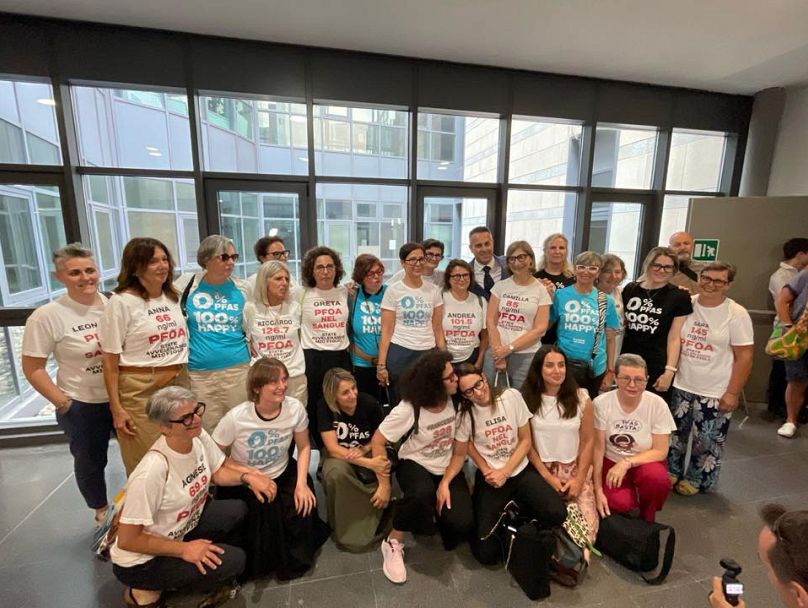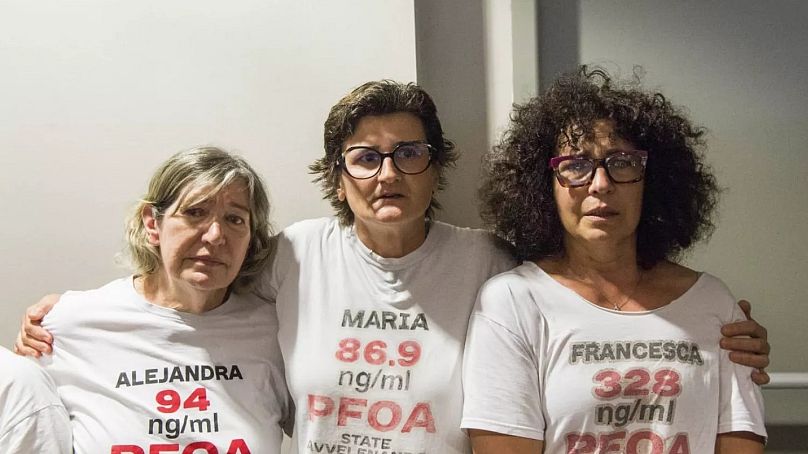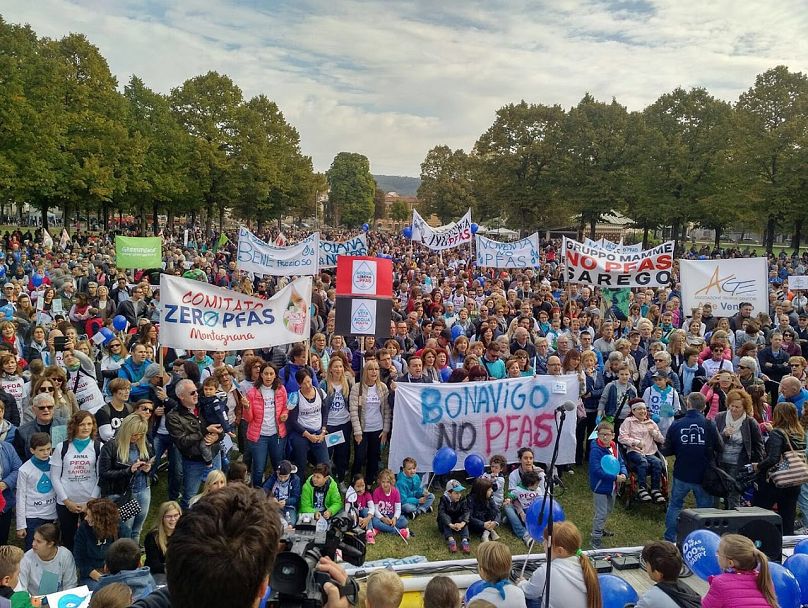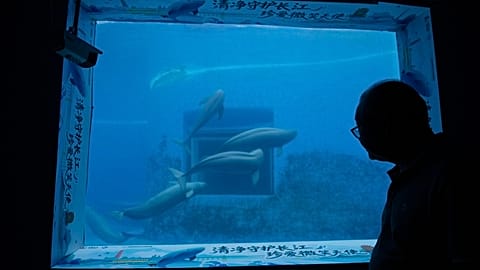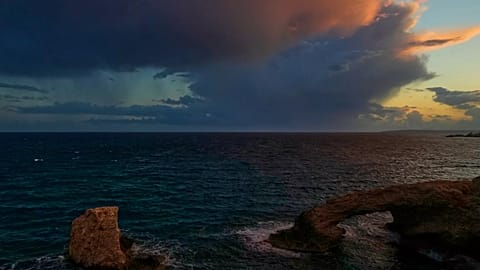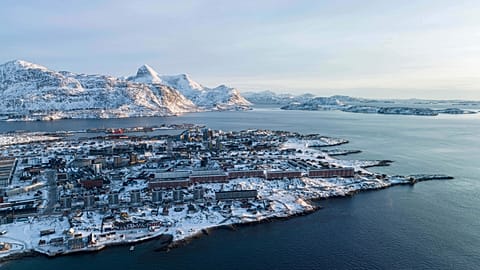The former managers of chemical company Miteni received prison sentences after being found guilty of water pollution in northeast Italy. What does this mean for other PFAS cases in Europe?
In June 2025, 11 former executives of the chemical company Miteni were sentenced to a total of 141 years in prison by a criminal court in Vicenza, in northeastern Italy.
These former managers were accused of multiple crimes, including deliberate poisoning of water, environmental disaster, illegal waste management and fraudulent bankruptcy.
Miteni, now insolvent, first came under scrutiny in 2013 when a study revealed toxic chemical contamination in aquifers and drinking water serving around 300,000 people in the Padua, Verona and Vicenza area.
The main pollutants were per- and polyfluoroalkyl substances (PFAS), man-made chemicals also known as “forever chemicals” because they don’t break down in the environment or the human body.
Widely used in items such as pizza boxes, non-stick cookware, and outdoor clothing for their resistance to water, grease, and fire, PFAS have been linked to serious health risks, including immune system issues, reproductive problems, and thyroid dysfunction. Perfluorooctanoic acid (PFOA), one of the PFAS produced by Miteni, has even been classified as carcinogenic by the World Health Organization and banned in the European Union (EU).
The trial began in 2021: on one side of the courtroom stood Miteni, on the other, around 300 civil parties. Among them was a group of women who always showed up, even on the day of the verdict, wearing white T-shirts printed with a black name and a red number.
They are Mamme No PFAS (Mums No PFAS), a group of mothers protesting PFAS contamination in Italy. They are among the most influential activists in Europe’s fight against these ‘forever chemicals’.
The name on their t-shirts is that of one of their sons or daughters, and the number represents the concentration of PFOA in their blood, followed by the sentence: “You’re poisoning my child”.
The pivotal role of Mamme No PFAS
Giovanna Dal Lago, a member of Mamme No PFAS, lives in the countryside near Vicenza. Her life and that of her family were turned upside down in 2017 when blood tests revealed dangerously high concentrations of PFOA in their children.
There is no universally agreed ‘safe’ PFAS concentration, but a 2022 report by the United States (US) National Academies of Sciences, Engineering and Medicine suggested that combined concentrations of seven PFAS (including PFOA) below 2 ng/mL are unlikely to cause harm.
As shown in the numbers printed on the group’s t-shirts, however, their children’s PFOA levels alone sometimes exceed 300 ng/mL.
“We were really worried,” Dal Lago tells Euronews Green. “We mothers started talking and sharing our concerns in the places where we used to meet: at the paediatrician’s office, after catechism, in the school garden.”
Between the discovery of contamination in 2013 and the blood test results in 2017, regional political and environmental authorities monitored PFAS levels in water and instructed water service managers to take remediation actions to contain the pollution.
Yet both officials and residents struggled to grasp the scale of the threat to public health from PFAS.
“In 2013, news came out about polluted water, but it was also followed by reassuring messages from our mayors and doctors ... when we got the test results, we were no longer calm,” Dal Lago explains.
Fearing for their children, Giovanna Dal Lago and other mothers affected by the contamination changed their habits, even avoiding tap water for brushing teeth. They began researching PFAS and pressuring authorities.
“It was like realising what environmental pollution really is, that what you release into the environment eventually ends up in your own body, in your blood. And that was shocking,” Giovanna Dal Lago tells Euronews Green.
In addition to protests and engagement with authorities and journalists, Mamme No PFAS also played a pivotal role in the Miteni trial.
As the group is not a formal association, its members participated in more than 130 hearings as individual civil parties, always wearing their distinctive T-shirts.
Despite the financial and personal cost, Dal Lago said that the verdict felt “almost like a miracle”.
The court found that Miteni’s managers were aware of PFAS contamination and had continued polluting regardless.
The ruling was even harsher than what the prosecutors had requested: they had sought 121 years of prison time, but the judges imposed 141.
On top of the sentence, the court also ordered compensation for the 300 civil parties involved in the trial.
“I cried because something unexpected had happened, but I also cried out of pain, thinking: ‘Look at what happened, how serious this is!’,” the activist explains.
A historic verdict?
The enthusiasm of Mamme No PFAS was shared by other groups involved in the trial.
Chiara Campione, executive director of Greenpeace Italy and Stefano Ciafani, president of the Italian environmental organisation Legambiente, both described the ruling as “historic”, a term later echoed widely in the media.
Hélène Duguy, environmental lawyer for Client Earth, agrees, noting that PFAS are a relatively new legal issue, and proving a causal link between pollution and harm is difficult.
“Here, the court seems to have acknowledged the major impact that the decisions of those people [ex Miteni’s managers] have had on the Veneto community. In that sense, it’s historic,” Duguy tells Euronews Green.
The lawyer also points out that the Miteni trial was among the first PFAS cases to reach criminal court and result in a final judgment. While there have been PFAS-related litigations and settlements in the US, they were mostly civil cases between organisations or individuals, and none resulted in jail time, Duguy states.
The lawyer underlines that the June 2025 Italian verdict was only a first-instance judgment and likely to be appealed, but Duguy believes “this case will have an influence on what's going to happen in the courtrooms of other countries”.
What about the other European PFAS cases?
A few kilometres north of Italy lies another European PFAS hotspot: Zwijndrecht, a Belgian town contaminated by PFAS from a 3M chemical plant.
Here, Jeroen Van Reeth, a resident of the highly contaminated “red zone” near the plant, is waiting for his garden to be dug up as part of a settlement between 3M and the Flemish government.
No criminal trial has yet convicted 3M managers in Belgium, but Van Reeth hopes the Italian ruling will make a difference. “It’s a good example of how it [PFAS contamination] can be addressed,” he tells Euronews Green. “They send out a message that this is not possible.”
As an activist with the collective Zwijndrecht Gezond, Van Reeth is also realistic. He knows the judgment can be appealed and that this is only the first step in a long battle.
A battle in which Mamme No PFAS remain at the forefront. “Now we expect the cleanup,” Dal Lago tells Euronews Green.
What’s next for Mamme No PFAS?
Remediation efforts to contain PFAS contamination in the Italian waters were initiated soon after the scandal, but the soil remains contaminated.
The companies responsible for the PFAS pollution are expected to present a remediation plan before the end of 2025, so the process is still quite slow.
Cleaning the soil is also very costly, since current technology struggles to break down PFAS's unbreakable molecules. According to a 2025 investigative project, removing PFAS from Europe could cost €2 trillion over 20 years.
“You pollute, and you repair; otherwise, there’s no justice,” Dal Lago tells Euronews Green. “We don’t care if these people [Miteni ex managers] go to jail, but we want them to shovel the ground with us.”
Mamme No PFAS, together with the other environmental organisations involved in the trial, is also asking for a European law to completely ban PFAS production.
Discussions are ongoing in Brussels, and all eyes are on December 2025, when the European Commission is expected to present a formal proposal to reform its chemical regulation.
To learn more about PFAS, life in a PFAS hotspot, and remediation techniques, tune in to episode 53 of Euronews Tech Talks on Wednesday, 17 September.
















